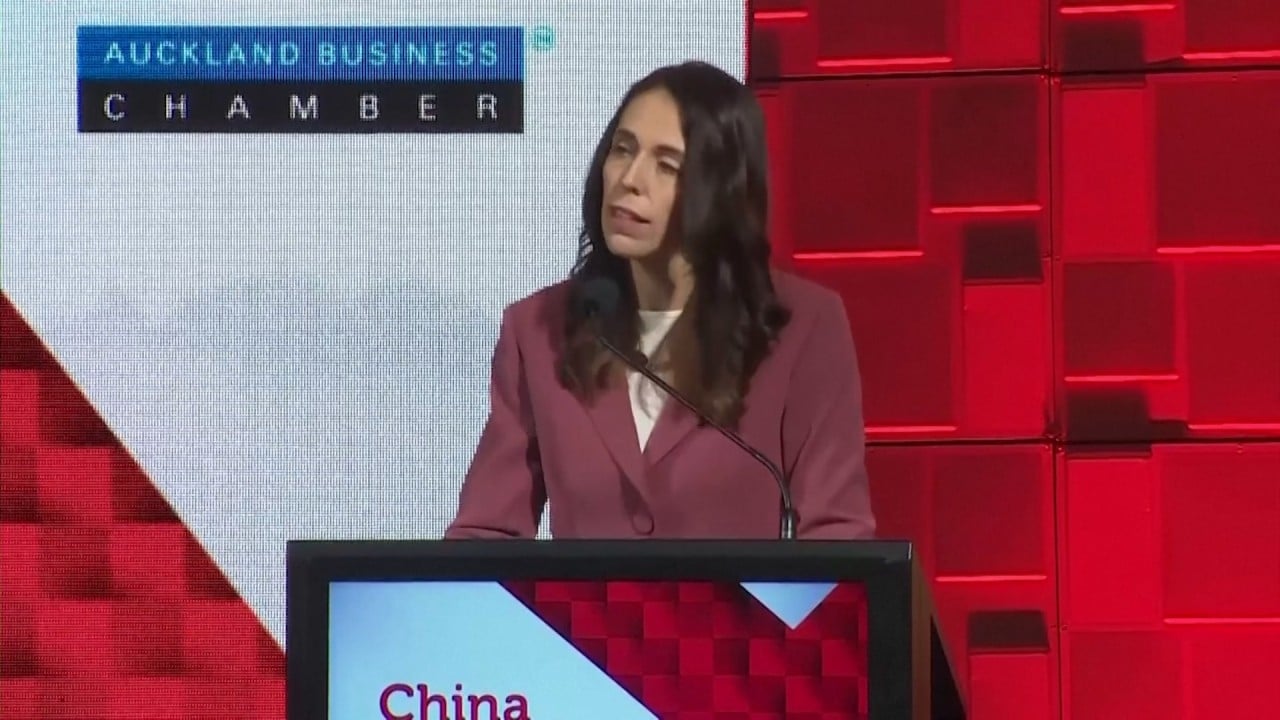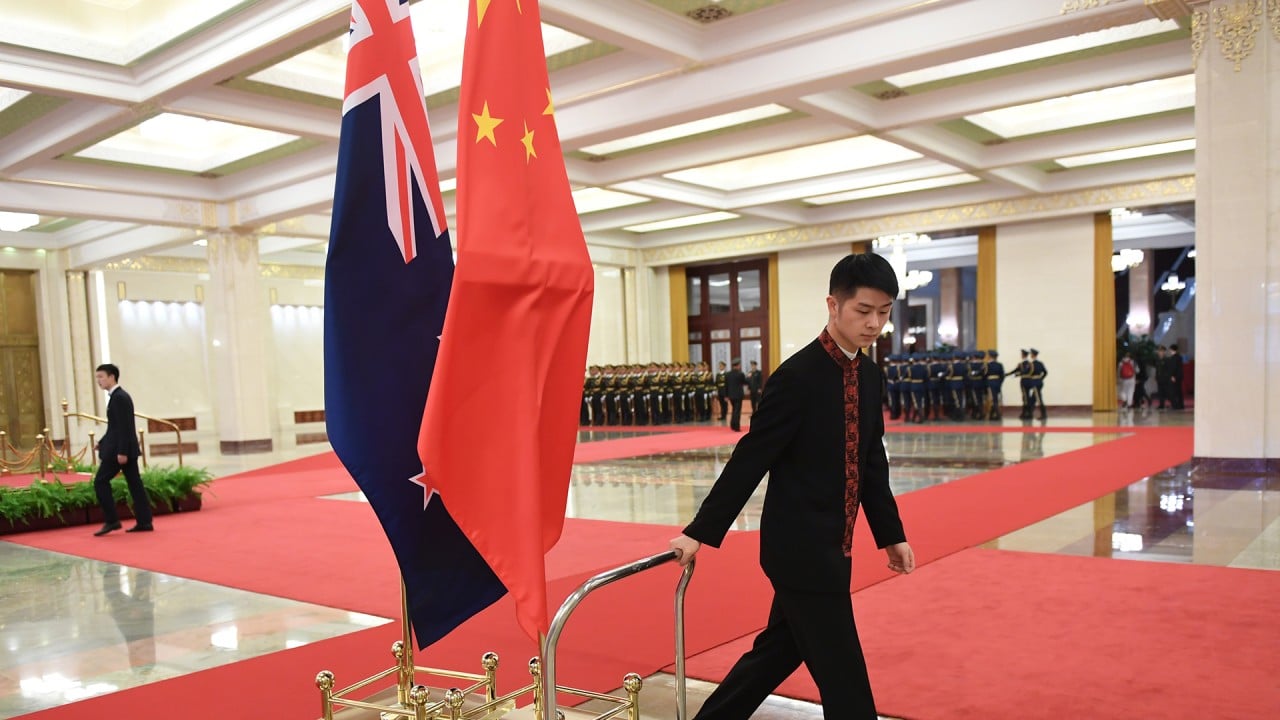Is New Zealand moving away from its traditional pro-China policy?
- Jacinda Ardern’s talk of differences becoming ‘harder to reconcile’ fuelled speculation Wellington may rethink approach to its largest trade partner
- But New Zealand is not taking sides in the US-China struggle – instead it is differentiating between countries and issues, such as Xinjiang and human rights

In the past 24 years, New Zealand has maintained a pro-China foreign policy that has been consistent under successive prime ministers, and is different from that of its larger neighbour Australia.
The Kiwis, as New Zealanders are often referred to, are proud of their independent approach towards relations with Beijing that has been defined by six “firsts”.
New Zealand was the first country in the “West” to support China’s accession to the World Trade Organization in December 2001. The South Pacific nation was also the first developed country to recognise China as a market economy under the WTO; the first developed country to start negotiating a free-trade agreement (FTA) with China; the first developed country to sign and ratify an FTA with China; the first Western country to join China’s Asian Infrastructure Investment Bank; and the first Western country to sign an MoU with China on the Belt and Road Initiative.
However, a recent speech by Prime Minister Jacinda Ardern has fuelled speculation about whether New Zealand is rethinking its approach to ties with China. Ardern, who took office in 2017 and has not deviated from the traditional policy approach to China though she has handled it with her own flair, made four points when she spoke at the China Business Summit on May 3.
The first three points were familiar to China watchers. She said that no country in the world could ignore China’s geostrategic relevance; second, New Zealand and China had very different perspectives on some issues, and there was a need to manage those differences effectively; and third, New Zealand and China needed to work together, especially on international trade, environment, climate change, and the global pandemic.
The fourth point was new and highlighted by several international media reports. Ardern said managing New Zealand-China ties would not always be easy and there would be no guarantees, as given the differences in histories, world views and political and legal systems, it was inevitable that both would have different perspectives on some important issues.
She illustrated this with examples of her government raising some concerns with China in private and publicly, such as “the human rights situation of Uygurs in Xinjiang” and “continued negative developments with regard to the rights, freedoms and autonomy of the people of Hong Kong”.

01:13
Differences with China ‘becoming harder to reconcile’, says New Zealand prime minister
She also struck a concerned note when she said: “And it will not have escaped the attention of anyone here that as China’s role in the world grows and the differences between our systems – and the interests and values that shape those systems – are becoming harder to reconcile.”
This portion of Ardern’s speech was what drove speculation that the leader was spotlighting the possibility of irreconcilable relations with China going forward.
But one must assess the rest of her speech before coming to any conclusion. For even as Ardern highlighted the differences in bilateral ties with China, she continued by saying that disagreements “need not derail our relationship, it is simply a reality”.
Towards the end of her speech, she made it clear New Zealand was keen to work with China. New Zealand, which will host the Asia-Pacific Economic Cooperation (Apec) summit virtually later this year said it would work with other Apec communities, including China, to “ensure that our economic responses to Covid-19 – in areas like trade and economic policy – are pulling in the same direction.”
This conclusion suggests continuity in New Zealand’s approach to relations with China and offers a more optimistic outlook for the bilateral relationship, where much is at stake.
China has been New Zealand’s largest trading partner with two-way trade standing at NZ$31.52 billion (US$22.66 billion) in 2020, up from NZ$1.9 billion (US$1.1 billion) in 1997. Last year, the country’s exports to China totalled NZ$18.63 billion and its imports were worth NZ$12.89 billion.
On January 26 this year, both sides signed an agreement to upgrade their free-trade agreement. Through this new agreement, New Zealand has gained greater access to the Chinese market, eliminating or reducing tariffs on New Zealand exports such as dairy, timber, and seafood as well as compliance costs.

01:25
China and New Zealand sign upgraded free-trade deal, eliminating nearly all trade tariffs
On the whole, Ardern’s speech reflects how countries have to position themselves as they navigate an increasingly bipolar world.
When the world’s two biggest powers, the United States and China, had good relations, countries such as New Zealand and Singapore found it easier to maintain independent foreign policies. It was not necessary for them to take sides.
But now the major powers have become increasingly competitive or confrontational, other countries find less space to be completely independent.
New Zealand is not taking sides and choosing one major power over the other. Rather, it is differentiating issues from countries – for example, Wellington has raised with China the matters of Xinjiang and Hong Kong, but not the South China Sea or Taiwan.
And while New Zealand is a member of the Five Eyes security alliance that includes the US, Britain, Canada and Australia, it is reluctant to be drawn into a coalition against China. In this sense, Ardern’s foreign policy is balanced and independent.
Professor Bo Zhiyue is founder and president of the Bo Zhiyue China Institute, a consulting firm providing services to government leaders and CEOs of multinational corporations